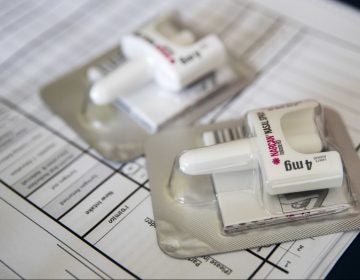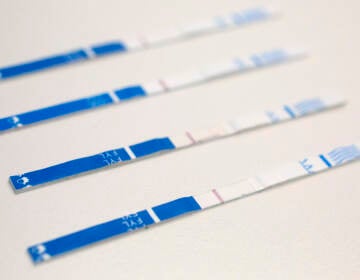Former Philly sportscaster Don Tollefson tries his hand helping others seek addiction treatment
Disgraced former Philly sportscaster Don Tollefson is trying to pay it forward.
Listen 5:16Every night for fifteen years, Don Tollefson was the sports anchor for the 11 o’clock Action News on 6ABC in Philadelphia. He was beloved by many viewers for his detailed game recaps, his enthusiastic analysis, and later in his career, his colorful play-by-play for the Philadelphia Eagles.
But “Tolly,” as he became known, had an alcohol problem, too. He’d sip from a Big Gulp filled with vodka and tonic before doing the news. Then, he was prescribed painkillers after a bad car crash in 2008, and got hooked on those, too.
“I was under the incredible delusion that if I could go on Fox [29] News, or I could work for the Eagles and get through it and nobody said anything, there must not be a real problem,” he said.
But then in 2015, Tollefson was convicted of stealing more than $340,000 from about 200 people who donated to his own charities and another foundation he worked for. He spent two years in state prison, where he got sober.
Now, Tollefson is trying to pay it forward.
From state prison to street ministry
While in prison, Tollefson began receiving mail from Gary and Lois Bishop, a couple from Harleysville Pennsylvania. They had started sending a religious newsletter to people in prison after their son was incarcerated, and requested they send him a Bible. The Bishops were fans of Tollefson, and when they heard he was going to prison, they tracked him down and sent him a copy of the newsletter.
“He wrote back and contacted us by phone and then we stayed in touch ever since,” Gary Bishop remembers.
With a lot of time on his hands behind bars, Tollefson said he did some reflection. He started making a list of all the people he credited with saving his life.
“It was a pretty long list,” he said. It included the Bishops, a few fellow inmates, and his daughter. It got him thinking about how he could be that person for others.
“I said, when the opportunity presents itself once I’m released, I’d like to see if i’d be comfortable having a street ministry to help addicted people,” said Tollefson.
When he got out of prison in 2016, he gave it a try. He headed out to one of the subway stops in Kensington — the Philadelphia neighborhood at ground zero of the opioid epidemic — and just start talking to people, using the same charm he did as a sportscaster with people on the streets.
Over the past year, he’s had business cards printed and tells people he encounters that he’ll answer his phone any time of day or night. He tries to get them to at least consider checking into detox, or if nothing else, go with him to an Narcotics Anonymous meeting.
As the opioid crisis has worsened and the recovery industry has grown along with it, more people like Tollefson who have experienced addiction themselves are stepping up to offer their help. Sometimes a person who has overcome addiction can be uniquely qualified to help another person go through the process, and many people used drugs point to a recovery community as being key to their sobriety. But experts who study addiction say personal experience is not the only qualification needed to help people.
Robert Fairbanks, author of “How it Works: Recovering Citizens in Post-Welfare Philadelphia,” says the recovery industry is full of people like Tollefson, because our economy doesn’t provide many other options for them — especially when they’ve done prison time.
“People, when they do get some sort of established sobriety, … will often see their own experience as their best form of expertise to get into some sort of career path of making a living of this,” said Fairbanks.
Recovery coaches often fill gaps in the treatment system left by professionals. For example, they can offer transportation or guidance in getting a driver’s license back or help someone apply for jobs. They can simply serve as a touchstone, similar to a sponsorship model in Narcotics or Alcoholics Anonymous.
Fairbanks, who is in recovery himself, added that because of a fundamental mistrust for medical systems and professionals, many people who use drugs or alcohol are more likely to accept help if it’s coming from someone who’s not a clinician, but instead from a minister or a friend — or sportscaster they know from TV.
For Jasmine Johnson, who has been in recovery for three years, it was just the fact that someone else understood what she was going through. She met Tollefson outside of her methadone clinic.
“We talked, I told him about my past, about getting high, tricking, getting kidnapped,” Johnson remembered.
“After that we would meet up for meetings, frequent phone calls,” he said. “He’s just been a great support system.”
Johnson stressed that being able to look to someone who had made it through recovery as a model was incredibly helpful to her, and so was having someone to call if she felt like using again.
“The number one thing that you don’t want to do is isolate,” said Johnson, ”because your mind is extremely powerful and addiction is cunning.”
One day, not long after he had started his street ministry, Tollefson got a call from the Bishops. They’d heard he was helping those in recovery now, and wanted to know if he’d be open to talking with their daughter, Shauna Roder, who had been struggling with alcohol addiction for many years and now lives with her parents and three children in Harleysville.
“I wasn’t ready for the help — I just wanted to keep doing what I was doing,” said Roder. “He would want me to go to AA and I was like, ‘I don’t want to do this right now.’ ”
Over time, Roder began to warm up to the idea of quitting drinking. She credits some of that to therapy during her most recent bout in rehab, which encouraged her to confront and work through past trauma. The techniques she learned there helped her figure out why she was compelled to drink, instead of just how to stop it, but she also credits Tollefson with helping her parents open their minds about her recovery process.
“Family for a long time was kind of judgmental and said, ‘Just stop,’ ” said Roder.
Tollefson assured her family that for someone suffering from addiction, simply “stopping” isn’t so easy. Gary Bishop, Shauna’s father, conceded that he used to see things in much more black-and white-terms. Now, he’s more understanding.
“She really wants to get free — I mean, it’s a difficult thing. I don’t know what it’s like to be addicted to something and not be able to get free of it,” Bishop said.
Cracking denial
While empathy is an important tool for getting through to someone, it only goes so far, said Leo Beletsky who studies addiction at Northeastern University in Boston.
There are plenty of rehabs and detox programs that don’t follow best practices. For example, many still abide by strict, abstinence-only guidelines that avoid the use of Medication-Assisted Treatment, or MAT — drugs like buprenorphine and methadone, which, combined with therapy are considered to be the standard of care for opioid use disorder. If someone detoxes without those drugs, and uses again once he or she leaves rehab, that person is much more vulnerable to an overdose because his or her tolerance will have gone down.
Beletsky says recovery coaches like Tollefson should be trained to understand these dynamics, recognize a good treatment center, and know how to advocate for their clients’ best care. Otherwise, they risk putting people in more danger.
“If we have folks who are well-intentioned, but they’re helping people find their way to programs that are going to do more harm than good, then they’re actually not being helpful,” he said.
Beletsky thinks recovery coaches should be required to go through a simple and affordable licensing process that would set some standards and hold them accountable.
“What that means is you need to have some minimal amount of training that’s relatively standardized, and where there is some assurance that the training reflects the latest science,” he said. He added that because this is a relatively new sector of the recovery economy, states and cities are just beginning to experiment with regulations around these positions.
Tollefson says he signs up for addiction counseling trainings every chance he gets. He also has about 25 volunteers that go out in the streets with him, and he suggests they do the same.
He says he doesn’t make any money off his ministry, so there’s no potential for corruption.
Ultimately, he says his own experience and notoriety are the most powerful tools he has to get through to people. In the same breath, he talks about detox and the chances of a second Eagles Super Bowl win with people on the streets of Kensington, and he eventually got through to Roder and her family because her dad knew who he was from the nightly news.
Tollefson says one thing keeping many people who are addicted from seeking help is denial that their situation is dire. So he hopes that for even just a few people, he can offer the tiniest “crack in that denial.”
“And I just try to go through that door with a tractor trailer,” he said.
—
This story was produced as part of “Battling Opioids,” a collaborative project by the seven Pennsylvania public television stations to bring awareness to opioid addiction. You can watch more stories and participate in a live call-in program Thursday from 8-9:30 p.m. on WHYY TV.
WHYY is your source for fact-based, in-depth journalism and information. As a nonprofit organization, we rely on financial support from readers like you. Please give today.





